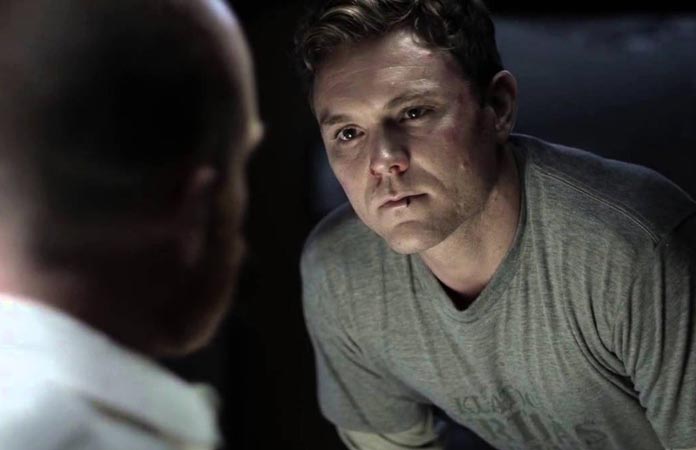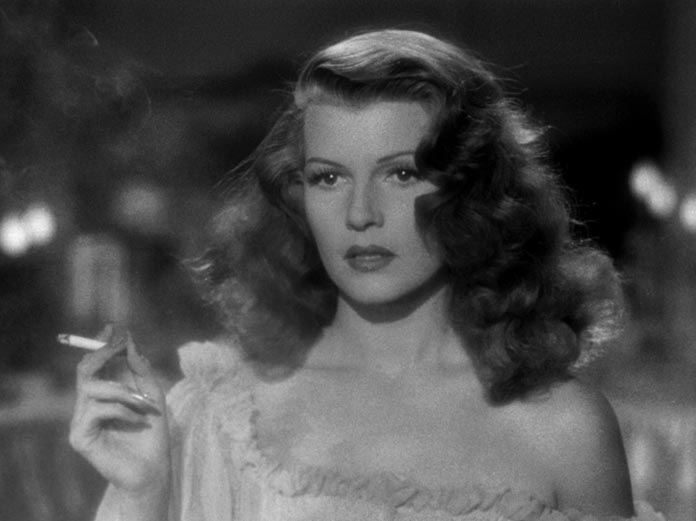Blu-Ray Review: Jack’s Back
Published on February 12th, 2016 in: Blu-Ray, Current Faves, DVD/Blu-Ray Reviews, Movie Reviews, Movies, Reissues, Retrovirus, Reviews |In 1986, I fell in love with James Spader. Sure, I was 15 and he was 25; and he was an actor and I didn’t actually know him; but it was real to me, damn it. I’d seen him on the big screen in Pretty In Pink, but he reminded me too much of the rich, preppy jackasses I knew in real life for me to develop anything but antagonism for him in reel life. (And what was up with his feathered, John Taylor-in-“The Wild Boys”-video hair, anyway?)
Serendipity intervened shortly thereafter: Tuff Turf was on HBO one night when I was at a friend’s house and that’s when it hit me: this James Spader guy was all right. Better than all right, in fact. As Morgan in Tuff Turf, he was perfect (and woe unto all the guys who didn’t measure up). Thus began my lifelong quest of watching every James Spader movie ever. That’s how I found out about Jack’s Back, released in 1988.
Blu-Ray Review: Convergence
Published on February 11th, 2016 in: Blu-Ray, Current Faves, DVD/Blu-Ray Reviews, Horror, Movie Reviews, Movies, Reviews |By Tim Murr
In the summer of 1999, Detective Ben Walls (Clayne Crawford) is enjoying time off with his wife and daughter when he is called in to investigate a bombing in downtown Atlanta. Not long after arriving on the scene, Walls is injured by a second blast, set intentionally to harm first responders. He awakens in the hospital, seemingly unharmed, but nothing is as it seems. Worse, the terrorist behind the bombing may be in the hospital with him.
DVD Review: A Brilliant Young Mind
Published on February 5th, 2016 in: Current Faves, DVD, DVD/Blu-Ray Reviews, Movie Reviews, Movies, Reviews |A Brilliant Young Mind, sadly changed from its far-superior UK title, X + Y, is a film that shows how much a fairly overdone concept can be elevated with outstanding performances, very thoughtful casting, and an intriguing directorial vision. It’s not the most innovative piece in the world, but for the kind of sentimental comfort food it’s aiming to be, it’s satisfying and even moving. Should you watch this movie? I think you should.
Blu-Ray Review: Gilda
Published on January 27th, 2016 in: Blu-Ray, DVD/Blu-Ray Reviews, Movie Reviews, Movies, Reissues, Retrovirus, Reviews |Toronto residents can watch a special theatrical screening of Gilda at The Royal tonight at 7:30 p.m., presented by the Ladies of Burlesque.
Without Gilda, my life would have been very different. As a naïve young English major at UC Santa Barbara, I registered for a Film Noir class to fulfill a requirement for my degree. I wasn’t new to old cinema; the giant poster of James Dean on my bedroom door and my stash of Gary Cooper movies recorded onto VHS were a testament to that. I didn’t know, however, about German Expressionism, Jim Thompson novels, the word “chiaroscuro,” or how important Citizen Kane was to the development of the noir style. I would soon learn.
Blu-Ray Review: I Am Thor
Published on January 25th, 2016 in: Blu-Ray, Canadian Content, Current Faves, Documentaries, DVD/Blu-Ray Reviews, Metal, Movie Reviews, Movies, Reviews |By Tim Murr
There is no good reason Thor weren’t bigger than KISS. Oh, sure, there were reasons, but not good ones. Starting out in the body building world before moving on to rock and roll, Jon Mikl Thor made a name for himself with feats of strength and great stage presence. His first serious foray into rock as Thor was a glam classic (Keep The Dogs Away, 1977). It should have been huge. It was not.
DVD/Blu-Ray Review: Frightmare (1981)
Published on January 22nd, 2016 in: Blu-Ray, DVD, DVD/Blu-Ray Reviews, Horror, Reissues, Retrovirus, Reviews, Underground/Cult |Think about something you hate, or try to remember something that made so little of an impression on you that recalling details about that thing is difficult or impossible. The shocking truth is that thing is someone else’s favorite thing in the whole wide world. It could be a song, a book, a movie; it doesn’t matter. Somewhere out there, someone’s thinking of that thing you despise with a fondness you will never understand.
Blu-Ray Review: Edgar Allan Poe’s Black Cats
Published on January 7th, 2016 in: Blu-Ray, DVD/Blu-Ray Reviews, Horror, Movie Reviews, Movies, Reissues, Retrovirus, Reviews |“The Black Cat” isn’t usually the first story that comes to mind when people think of Edgar Allan Poe. It tends to get overshadowed by his poem, “The Raven,” or his story, “The Tell-tale Heart,” which actually shares a lot of plot devices with “The Black Cat,” but that’s not important right now. What is important is that Poe’s work is public domain. No one owns it. That makes his work ripe for the gutting by film producers and writers. Slap Poe’s name on it somewhere and you’ve got a built-in audience of horror fans and American Literature majors.
Roger Corman certainly made his nut making quickie Poe flicks, but that’s not important right now, either. What is important is what happened to “The Black Cat” in the hands of two stylistically different Italian directors, horror maestro Lucio Fulci and giallo king Sergio Martino. Their two versions of Poe’s old tale can be found in one beautiful box set from Arrow Video.
DVD Review: Deathgasm
Published on January 6th, 2016 in: Comedy, Current Faves, DVD, DVD/Blu-Ray Reviews, Horror, Movie Reviews, Movies, Music, Reviews |By Tim Murr
Many movies have attempted to capture the coming of age journey, of misfits finding their path and rising to their true potential or becoming the hero they were always meant to be. Deathgasm proves that most of these movies are utter bullshit.
Best Of 2015: Less Lee Moore
Published on January 1st, 2016 in: Best Of Lists, Comedy, DVD/Blu-Ray Reviews, Horror, Movies, Music, Reissues, Retrovirus, TV |For more discussion about the items on my list, check out the Popshifter Best Of 2015 Podcast!
Many thanks to the following: All the writers at Popshifter but especially Melissa Bratcher, Brad Henderson, Tyler Hodg, Jeffery X Martin, and Tim Murr for being so generous with their time and talent; all the fantastic PR folks that help make everything possible (too many to list!); Kier-La Janisse and Paul Corupe at Spectacular Optical for graciously publishing my essay on Ricky Kasso in their Satanic Panic: Pop-Cultural Paranoia in the 1980s anthology; the kind people of Rue Morgue for publishing my music reviews in the magazine as well as my Frightful Flashback column on the blog; the good folks at all of the websites who invited me to write for them this year: Everything Is Scary, Nerdy Stuff, Modern Horrors, Dirge Magazine, and Biff Bam Pop; Colin Geddes and Carol Borden for being terrific and for letting me write for the TIFF Vanguard and Midnight Madness blogs again; and last but certainly NOT least, Shaun Hatton for being a generally awesome person.
And now, for the lists!
(more…)
The Official Popshifter Podcast, Episode #04: Texas Gators
Published on November 27th, 2015 in: Blu-Ray, Concert Reviews, DVD, DVD/Blu-Ray Reviews, Movie Reviews, Movies, Music, Music Reviews, Podcasts, Reissues, Retrovirus, Reviews, Teh Sex |Welcome to Episode 4 of The Official Popshifter Podcast. This one is titled “Texas Gators, Violent Pornography, and Tales from the Pit.”
Already, you should be enticed. It’s another fascinating discussion of American pop culture with Less Lee and X! Please enjoy. Preferably with a nice glass of cold Bosco.
Reviews:
DVD Review: The Farmer’s Daughters
Blu-Ray Review: The Beast (from Dirge Magazine)









